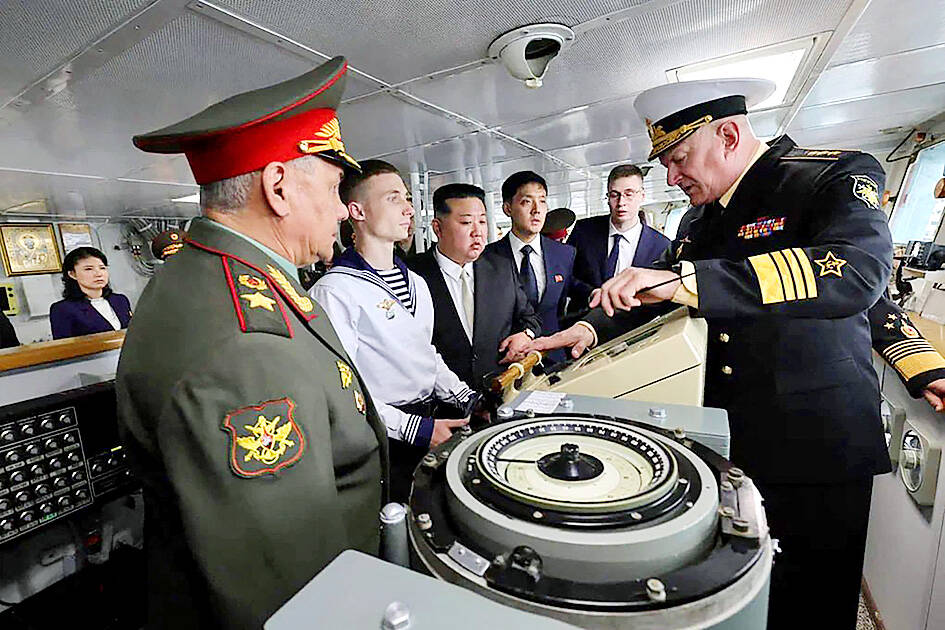North Korean leader Kim Jong-un yesterday inspected Russian nuclear-capable strategic bombers, hypersonic missiles and warships, accompanied by Russian Minister of Defense Sergei Shoigu.
A smiling Kim was greeted at Russia’s Knevichi airfield, about 50km from the Pacific city of Vladivostok, by Shoigu, who saluted Kim. The North Korean leader then inspected a guard of honor.
The US and South Korea fear that the revival of Moscow’s friendship with Pyongyang could give Kim access to some of Russia’s sensitive missile and other technology in exchange for helping arm Russia for its war in Ukraine.

Photo: AFP / Russian Defence Ministry
Shoigu showed Kim Russia’s strategic bombers — the Tu-160, Tu-95 and Tu-22M3 — which are capable of carrying nuclear weapons and form the backbone of Russia’s nuclear air attack force, the Russian Ministry of Defense said.
“It can fly from Moscow to Japan and then back again,” Shoigu told Kim of one aircraft.
Kim was shown asking about how the missiles were fired from the aircraft, at times nodding and smiling.
Shoigu showed him the MiG-31I supersonic interceptor aircraft equipped with Kinzhal hypersonic missiles. The Kinzhal, or dagger, is an air-launched ballistic missile capable of carrying nuclear or conventional warheads. It has a reported range of 1,500km to 2,000km while carrying a payload of 480kg and can travel at up to 10 times the speed of sound, or 12,000kph.
After the aircraft and missiles, Kim inspected a warship from Russia’s Pacific fleet in Vladivostok, where he was due to watch a demonstration by the Russian navy.
South Korea and the US on Friday said military cooperation between North Korea and Russia would contravene UN sanctions against Pyongyang, and that they would ensure a price was paid.
Russia has gone out of its way to publicize Kim’s visit and drop repeated hints about the prospect of military cooperation with North Korea, which was formed in 1948 with the backing of the Soviet Union.
For Russian President Vladimir Putin, who says Moscow is locked in an existential battle with the West over Ukraine, courting Kim enables him to needle Washington and its Asian allies while potentially securing a deep supply of artillery for the war in Ukraine.
Washington has accused North Korea of providing arms to Russia, which has the world’s biggest store of nuclear warheads, but it is unclear whether any deliveries have been made.

TRAGEDY STRIKES TAIPEI: The suspect died after falling off a building after he threw smoke grenades into Taipei Main Station and went on a killing spree in Zhongshan A 27-year-old suspect allegedly threw smoke grenades in Taipei Main Station and then proceeded to Zhongshan MRT Station in a random killing spree that resulted in the death of the suspect and two other civilians, and seven injured, including one in critical condition, as of press time last night. The suspect, identified as a man surnamed Chang Wen (張文), allegedly began the attack at Taipei Main Station, the Taipei Fire Department said, adding that it received a report at 5:24pm that smoke grenades had been thrown in the station. One man in his 50s was rushed to hospital after a cardiac arrest

SAFETY FIRST: Double the number of police were deployed at the Taipei Marathon, while other cities released plans to bolster public event safety Authorities across Taiwan have stepped up security measures ahead of Christmas and New Year events, following a knife and smoke bomb attack in Taipei on Friday that left four people dead and 11 injured. In a bid to prevent potential copycat incidents, police deployments have been expanded for large gatherings, transport hubs, and other crowded public spaces, according to official statements from police and city authorities. Taipei Mayor Chiang Wan-an (蔣萬安) said the city has “comprehensively raised security readiness” in crowded areas, increased police deployments with armed officers, and intensified patrols during weekends and nighttime hours. For large-scale events, security checkpoints and explosives

A car bomb killed a senior Russian general in southern Moscow yesterday morning, the latest high-profile army figure to be blown up in a blast that came just hours after Russian and Ukrainian delegates held separate talks in Miami on a plan to end the war. Kyiv has not commented on the incident, but Russian investigators said they were probing whether the blast was “linked” to “Ukrainian special forces.” The attack was similar to other assassinations of generals and pro-war figures that have either been claimed, or are widely believed to have been orchestrated, by Ukraine. Russian Lieutenant General Fanil Sarvarov, 56, head

PUBLIC SAFETY: The premier said that security would be tightened in transport hubs, while President Lai commended the public for their bravery The government is to deploy more police, including rapid response units, in crowded public areas to ensure a swift response to any threats, President William Lai (賴清德) said yesterday after a knife attack killed three people and injured 11 in Taipei the previous day. Lai made the remarks following a briefing by the National Police Agency on the progress of the investigation, saying that the attack underscored the importance of cooperation in public security between the central and local governments. The attack unfolded in the early evening on Friday around Taipei Main Station’s M7 exit and later near the Taipei MRT’s Zhongshan